INVESTIGATION… Inside Benue where quack doctors perform surgeries, remove uterus for abdominal pains
The level of quackery in Benue state is alarming. In rural communities, quack doctors perform surgeries on patients for non-surgical conditions like Pelvic Inflammatory Disease (PID), Urinary Tract Infection (UTI) and functional abdominal pains that require only anti-biotics treatment. The state, is also reported to have the highest number of Schools and Colleges of Health Technology in the country where these quacks are trained and churned out.
Unfortunately, most of them are not registered and authorities are doing nothing to end the widespread practice. Investigative Journalist Patrick Egwu, travelled to the state and went undercover to expose some of these clinics and local hospitals where quack doctors cut gullible patients open, remove vital organs and stitch them back for minor health challenges.
Gboko: Home of quacks
On a sunny Wednesday afternoon, after journeying through the pot-holed roads, I arrived Gboko – one of the busiest towns in Benue state from Makurdi to investigate high cases of quackery in the state. My contact had briefed me on the increasing rate of quackery and unregistered clinics in the state where these surgical procedures are carried out on victims for non-surgical conditions.
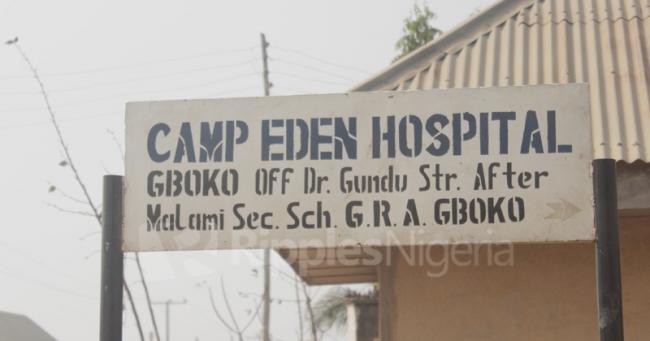
Camp Eden hospital, a suspected fake clinic
“What is your name?” a receptionist at Camp Eden Hospital, one of the hospitals with such reported cases of quackery asked me.
“Solomon Peter,” I responded.
After putting down my details and other information, she issued me the hospital’s card for N1000 and I was ushered into the doctor’s office. Once inside, the doctor asked what was wrong with me.
I told him that I was feeling sharp pains in my lower abdomen.
He asked me to lie down on the examination couch for some examination. Gently, after touching my lower abdomen and other parts of my body, he asked me to stand up and sit down.
“Since when did it start?” Dr Gbillah who is the chief medical officer at the hospital asked while using a sanitizer to clean his hands.
“For about a week now,” I responded almost immediately.
He directed me to the lab technician for some tests which he had written for me on a plain paper. After making the necessary payments and showing the lab technician receipts, he asked me to sit down so he can collect my blood, urine and stool samples so he can carry out the tests.
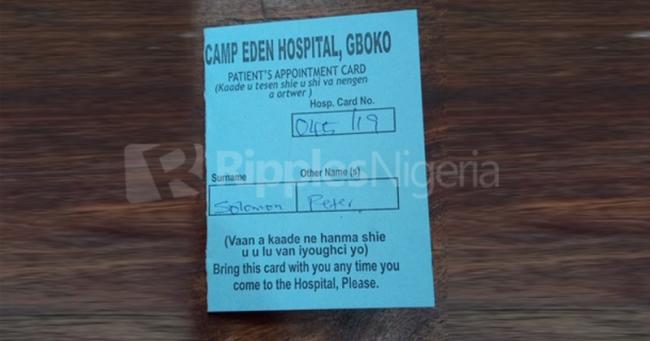
Camp Eden Hospital Card, used by Ripples Nigeria investigator
I couldn’t produce stool so he used a syringe to collect my blood samples and gave me a universal bottle to produce my urine. I did and returned with the urinary sample. After about 45 minutes, the results were out.
“You have kidney infection and malaria,” the doctor told me as he handed me the test result in a file which the hospital had opened for me some two hours ago. In awe, mouth aghast, I continued staring at him as he once again, scribbled down on a plain paper in front of his desk. “That is the result of the test,” he said and showed me the list of drugs and injections I will take to start the treatment process. “You will be fine if you start the treatment.”
After my session with the doctor who had told me that I have kidney infection and malaria, not satisfied, I visited another hospital to carry out another test to verify the authenticity of the test carried out by the previous doctor.
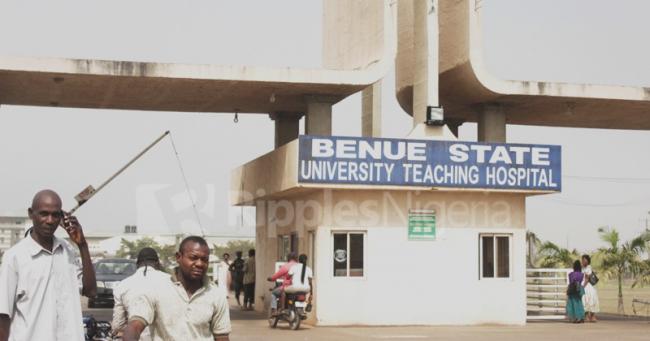
Benue State University Teaching Hospital, where Patrick second-checked diagnosis of the quack doctors
This time around, I left all the hospitals in Gboko for Benue state Teaching Hospital in Makurdi, the state capital. After requesting to see the doctor and paying N1000 for card, I was ushered into a long waiting queue. After waiting for about one hour, I was inside the doctor’s office for the usual examination before proceeding to the testing section. As usual, my blood and urine samples were collected and analyzed. One hour later, the result was out – no kidney infection, no malaria.
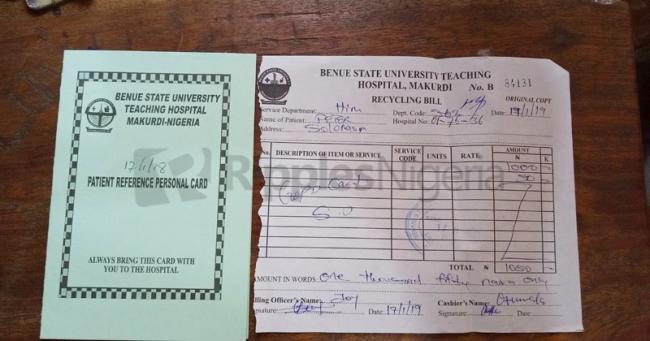
Card and receipt from Benue State University Teaching Hospital
“For a suspected kidney infection, you need to check the history, that is taking complaints and characterizing it,” said Dr Ayo Mofe (real identity protected for fear of attack by quacks), a physician at a local hospital, in Abwa, Buruku local government area of the state. “After that, you have examination before investigation which includes urine analysis, blood test and then an abdominal scan. Most importantly, kidney infection is usually not an indication for surgery. Anti-biotics alone would be enough.”
However, no abdominal scan was done on me by the laboratory technician at Camp Eden Hospital where I was diagnosed with kidney infection by the doctor. Only my blood and urine samples were taken to run the test.
‘Come tomorrow for surgery’
Disguised as a Youth Corps member, I visited Progress Hospital, one of the few hospitals in the town known for wrong medical diagnosis and treatment.
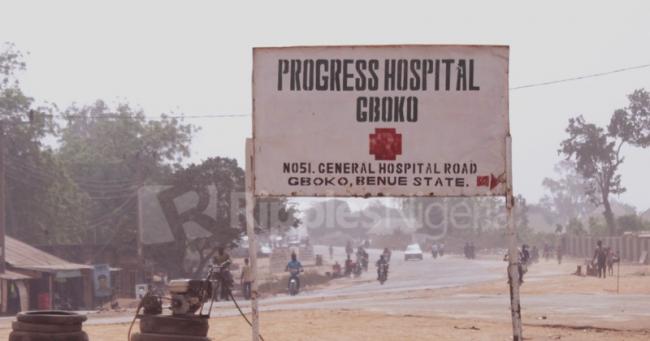
Signboard of Progress Hospital, another suspected fake clinic
At the entrance of the hospital, the doctor in charge was already leaving. We exchanged greetings and he asked who I was looking for. He was the only one in the hospital – no nurse, lab attendant or receptionist. So he wanted to find out who I wanted to see.
“I’m having some pains in my abdomen so I decided to come to seek medical attention here,” I said, holding my lower abdomen where I had complained of pains.
“Please come inside,” he said, opening the door of the hospital which he was about closing when I met him.
He ushered me into his office and asked me to give him more details of what was wrong with me. I did, while pretending to be in pains.
He asked me to lie down on the examination couch in his office so he could examine me properly. He asked me to loosen my belt; and started touching my lower abdomen.
“Is it paining you?” he asked kindly.
“Yes, it is but not too much,” I responded.
He asked me to stand up. I did and followed him to sit opposite him at his table.
“You have appendicitis,” he told me after pausing for some seconds and without conducting or asking for any test for confirmation.
“Appendicitis,” I exclaimed.
“Yes it is and you can come tomorrow for the surgery if you are ready so we can remove it. But if you are still in doubt, you can go and carry out a test at a laboratory but I know it is certainly appendicitis,” he suggested.
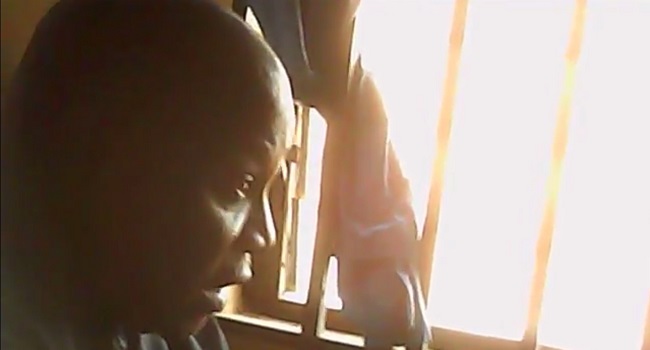
Undercover picture of the ‘doctor’ at Progress Hospital
When I told him that I am a Youth Corps member and don’t know my way around town, he gave me directions on how to locate a laboratory where I can carry out the test.
“When you finish, bring the result to me,” he added.
“To diagnose acute appendicitis, clinical evaluation – that is history and examination, plus a few lab tests – is often enough,” Mofe said.
Mofe said the Alvardo scoring system which shows the likelihood of appendicitis based on symptoms, signs and lab data and not an X-ray is used to diagnose acute appendicitis.
“This has a set of 10 parameters in it including some clinical features like fever, nausea, vomiting, loss of appetite, migratory abdominal pains, tenderness on the right lower part of the abdomen, and elevated white cell count.
On a scale of 10, if the patient scores 0-3, it is definitely not appendicitis, so he’d be discharged home on drugs. But 4-6 is probable case of appendicitis, so he’d go for further evaluation. Here, a CT scan is preferable, as an X-ray would definitely not show it. Sometimes, an ultrasound scan may show it. So, in resource poor settings, that’s what is used instead of a CT scan. Then 7-10, is a definite case of appendicitis, and needs no further evaluation – surgery can be done out-rightly,” he explained.
From small lump to full cancer: The story of Emmanuella
When Emmanuella Peter, 11, started developing a small lump at the back of her left ear, her parents thought it was something drugs or other medical treatment could cure. They were wrong.

Early stage of cancerous growth on Emmanuella
Last year, Dr Gbillah, the same doctor who had diagnosed me with kidney infection and malaria at Camp Eden Hospital, carried out a surgical procedure on Emmanuella to remove the small lump growing around her left ear. One week after the procedure, the lump had returned – this time around, larger than a fist. When the family returned with the girl to the hospital where the procedure was first carried out, the doctor said he had done his best and walked the family out. They left, heartbroken.
“The growth started out like pimples last year around January,” said Silas Peter, Emmanuella’s father, explaining how the lump started developing. “I took her for laboratory test and when the result came out; they said it’s an infection. From there, they referred me to Camp Eden Hospital saying that is the place where they handle such cases,” Peter said, narrating how he found his way to Camp Eden Hospital.
“So I took her there and showed the doctor the test result but he refused and said he would conduct another test which he did and I paid,” he said.
When asked if the laboratory result at Camp Eden Hospital was different from the previous test, he said “He didn’t show me the result of the test. After the test, he said he would operate on her. I asked him what was wrong with the baby that he wants to carry out a surgery but he refused to tell me.”
Left with no choice but to help his child reduce the pains she was suffering as a result of the lump, Peter succumbed to the surgery required by Dr Gbillah.

Emmanuella after surgery
“The lump was growing, she was in pains and I had no other choice than to pay N15, 000 for the surgery. He did the surgery and removed the lump. After the operation, I checked the card to know what is written in it but I saw only ‘growth’,” he said.
“After the surgery, he said he would dress the wound for seven days and my child would be fine. He charged me another N4,000 for the dressing. But after the seven days, there was no improvement so I opened the wound myself to see that the growth was coming out more than it was before the surgery,” Peter said, looking depressed.
Not satisfied with the outcomes of the surgery, Peter went back to the hospital to demand for answers.
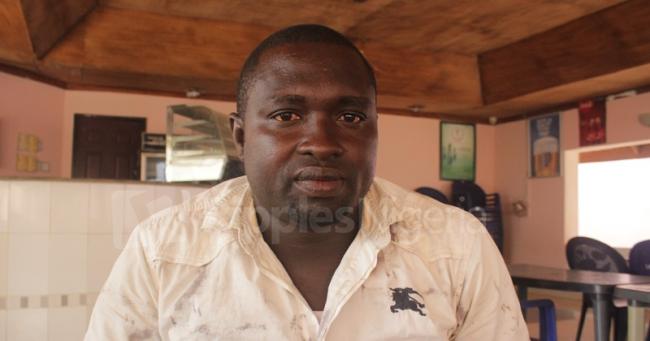
Silas Peter, Emmanuella’s father
“I met the doctor and told him that he promised that the dressing of the wound will be for seven days but after seven days, no improvement, the growth was coming out more than what was there before. The man pursued me saying ‘If I don’t have a job, that he has one and that he is tired and if I’m not tired, he is tired and said I should take my child out from his hospital’,” he said.
The next day, after their ugly encounter at Camp Eden Hospital, they were recommended to a humanitarian, Ukan Kurugh, who has been using the social media to campaign against the high level of quackery, and sourcing funds for victims for proper medical treatment outside the state.
Kurugh, when briefed on the situation with the doctor in the community, took them to a specialist hospital in Makurdi, the capital where proper treatment and attention would be given to them. When doctors in the hospital went through Emmanuella’s medical history and examined the lump, they found out it was now cancerous and shouldn’t have been tempered with in the first place through surgery.
“When they referred them to me and I saw the growth, I said no, that this girl is too small to have this type of growth. At the hospital, after carrying out their own tests, the medical doctors said the lump is now cancerous and that the first doctor should not have tampered with it,” said Kurugh. “They said this was just a growth that would have been nursed to a point of cutting it off or giving drugs that will dry it and not to have tampered with because they tampered with it and it became cancerous. Now, we have done six sessions of chemotherapy on the girl and each session costs N55,800. When we got to the fifth session, the growth had died off completely and when we got to the sixth, the girl was not affected and she was even playing with her friends and all that,” Kurugh said recalling their experience during the chemotherapy.
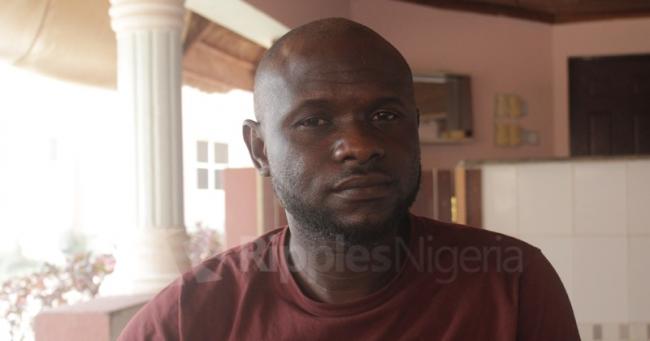
Kurugh has been battling quack doctors and helping victims
“I was lucky to take her there, if not she would not have survived. The lump was not growing fast like this until the man tampered with it. After the surgery, in less than two weeks, the lump grew ten times more than it was before,” Emmanuella’s father said.
Kurugh who has been receiving lots of threat messages and warnings because of his campaigns against the high level of quackery in the state, said “the truth is most of them operate without license neither do they have basic facilities to run a hospital.”
As a humanitarian, most of the cases I have handled are from Gboko and I have written constantly that hospitals, dispensaries, pharmacies, chemists in Gboko are quacks. It is the home of quackery in the state and they are not checked by the government. A lot of hospitals in Benue state that I know are not properly registered and they have not followed the due process to exist.”
However, after the six sessions of chemotherapy on Emmanuella without follow up treatments because of funds, the lump which had almost disappeared started coming back again, this time around, bigger, too.
Peter, who is jobless after studying civil engineering at the Federal Polytechnic, Mubi in 2005, said he’s scared he might lose his child without carrying out the necessary follow up surgeries and treatments.
“I don’t know what to do and the money they called for the surgery to heal her, I cannot afford it. So I’m waiting for Kurugh to help me in raising the funds. They said it would cost over N600,000 for the remaining two stages of surgeries because the growth is out again.”
Womb, fallopian tubes, appendix removed
Last year, Terngu Kamo, 47, a widow, was having waist and abdominal pains. She decided to visit a local clinic where she lives to find out what was wrong with her. Instead of prescribing drugs for waist and abdominal pains she complained of, her womb, fallopian tubes, and appendix were removed. The clinic told her a scan result showed she has problem with her uterus and convinced her for a surgery. They did. A week, later complications set in.
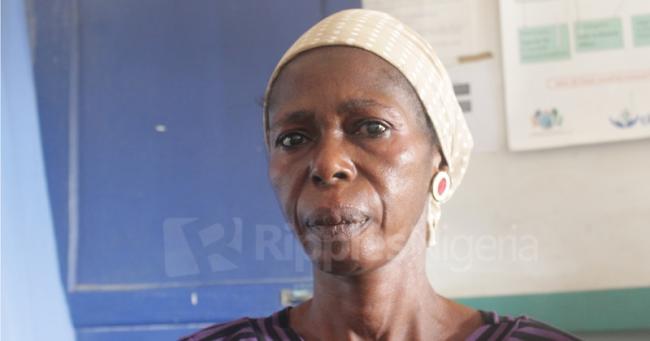
Kamo’s uterus, fallopian tubes and appendix were removed by quack doctors instead of prescribing drugs for abdominal pains she complained of
“They also removed my appendix,” Kamo said, recalling the traumatic experience she had in the hands of quacks at the local clinic. “I was having abdominal pains. When I went to the clinic, they did scan on me and said that I have a problem with my womb and they carried out surgery on me.”
“When I returned home, I was dizzy and tired. They took me back to the hospital again. They said I was short of blood and water in my body. After their treatment, I returned home,” she said recalling the second time she went to the hospital.
Not long after she returned, she started having stomach pain and was not eating or drinking water neither was she urinating nor passing stool as a result of the complications from the surgeries.
“So when they took me to another hospital, they treated me and I got a lot better,” she said.
“The woman was complaining of lower abdominal pain which from the retrospective history I got from her, looks like a Pelvic Inflammatory Disease (PID) that could have been treated with antibiotics for fourteen days,” said Mofe, who later got the right diagnosis and treated Kamo when she was finally brought to his hospital.
“They took her into the theatre, removed her uterus, tubes, ovaries and appendix – everything. Now, they brought her here in a very bad shape. She was leaking feces into her abdominal cavity. I was the one who treated her and now she is fine. Thankfully, she has completed her family, if not; she’d have issues with conception. And the clinic where the surgery was done, nobody has questioned them why they did the surgery on this woman. So it keeps going on because there is no accountability. The people responsible are never questioned for anything,” he said.
Since 2015 when he came to the community, Mofe has been handling many referrals and cases of victims who had undergone unnecessary quack procedures in the state.
When Faith Abum, 35, had her first surgery for abdominal pains few years ago, she thought that would be the last. However, she ended up, within a space of five years, having four surgeries she shouldn’t have had in the first place. Three of the surgeries were in the same hospital.
“The first time was abdominal pain. They did a scan and diagnosed appendicitis and it was removed,” Abum said. “The second time, they diagnosed fibroid and it was removed. The third time, fibroid again and the fourth time, it was adhesion.”
When the pains couldn’t stop after the surgeries, she left her village in Ushongo local government for the Teaching Hospital in the capital for proper treatment.
“They gave me some drugs and the pain has reduced. I’m feeling better now,” she said.
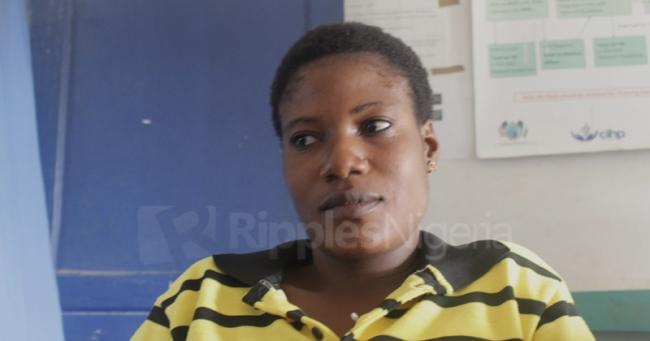
Abum has had four surgeries (three were at the same hospital) and due to complications, she now finds it difficult to go to the farm
The mother of two boys now has complications whenever she goes to the farm as a result of the multiple surgeries she has had.
“Not all fibroid needs surgery and you don’t do multiple surgeries for fibroid,” said Mofe. “The effect of multiple surgeries is dense adhesion in her pelvis which gives her chronic pelvic pains and that is the pain she usually complains about. It also makes it easier to develop infection. The third one is that it can also lead to infertility.”
Similarly, Mofe said not all health cases require surgery and that there are procedures to be carried out on a patient before proceeding for surgery. Unfortunately, according to him, most of these quack doctors and clinics in the state don’t follow these procedures.
Kamo who is a local farmer in her village and has seven children, said she finds it difficult to go to the farm or do any strenuous job to feed her family. Instead, she hires and pays labourers to work in her farm while she looks on, unable to do anything.
“I am very tired to do anything now especially my farm works. I pay people to do the work and it is really challenging for me,” Kamo said, looking visibly disturbed.
“If I recover well, I will be able to do the work by myself because if I don’t do it, where will I get food to feed my family?” she asked.
Quacks, Schools and Colleges of Health Technology everywhere
For every town or community in Benue state, there is about two or more School of Health Technology or Colleges of Health Management. While in a cab going to Gboko, I sighted more than three of such schools with their big sign boards visibly mounted along the road to attract “customers.”
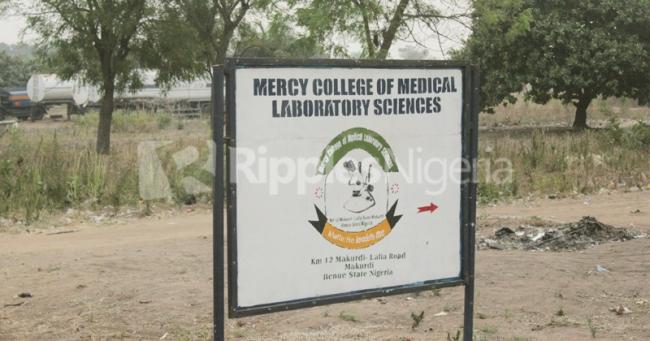
Mercy College of Medical Laboratory Sciences, one of the many medial schools in Benue state
These Schools of Health Technology mostly train Community Health Extension Workers (CHEW), Birth Attendants (BA), Clinic Attendants (CA), Lab Attendants (LA) and Theatre Technicians (TT). They are the ones who usually operate quack clinics and carry out these surgeries.
“They are everywhere you go in Benue state,” Mofe said, making reference to the proliferation of Schools of Health Technology in the state. These schools we have here are not properly supervised so these people keep on churning out students every year without plans on how to absorb them into the system.”
“Ten minutes walk from here; you will find a School of Health Technology. From there to a 30 minutes drive, there are about three of such schools along the road. Within a 30 kilometer drive, you will find three or four of such schools. How about the whole state? This will give you an idea of what is happening and it is even worse inside the remote villages.”
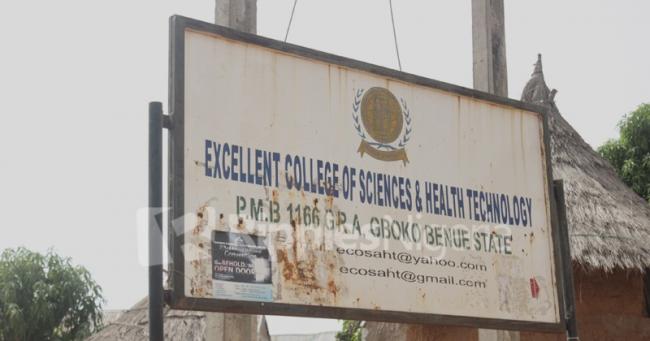
Signboard of Excellent College of Sciences and Health Technology
“These health programmes were actually brought into existence by the federal ministry of health. They were meant to be in operation in the rural areas where you may not have doctors, or are not readily on ground. But what they are meant to be treating is basic ailments like uncomplicated malaria, respiratory tract infection, and diarrhea. Also, they embark on health education and immunization campaigns. Once you see any case that is above you what you are meant to do is to refer. But unfortunately, any good thing meant to help the masses in Nigeria somehow becomes misused.
“So, I think the schools that are sending these quacks into circulation should have a plan in place, or monitor them to make sure that they are doing what they are actually meat to be doing and not what they are not trained for,” Mofe explained.
A physiotherapist, Ernest Obetta who had worked with one of the hospitals in Gboko before resigning few months ago, said some of the health workers especially CHEW for example, take the place and duties of the nurses even when they were not professionally trained for such roles.
“That is what they do over there. They dispense drugs; work as nurses in the wards by dressing wounds and even in the physiotherapy department. They are meant to be at community health centres serving as first contacts before making referrals when necessary. In fact their roles have not been properly defined,” he said.
“Even here in Makurdi, it happens. Most of them are not qualified or certified to open a hospital. I know a hospital here where in the laboratory, the person who was placed there is a microbiologist instead of a lad scientist. That is one of the challenges.”
The proliferation of schools like these, have been traced to the increase in quackery in the state. Once the students graduate for a number of years of study which is normally between two to three years, they are churned out to look for where to practice their profession. In most cases, those of them who couldn’t find any hospital to attach themselves, immediately open up a “one room clinic” where they, without license and proper training, or registration, carry out these surgical procedures on gullible patients.
At one of such “one room clinics,” a young girl of 25 years had her ovaries removed in the name of abdominal pains. The bad news – she might not have a baby again.
“She was having chronic abdominal pain which could probably be pelvic inflammatory disease. She went to one of these quacks and they removed her ovaries telling her that she has cyst,” said Mofe, who handled her case when she was referred to his hospital.
“When she came here, I was taking her history and the history was pointing towards menopause. I was then asking myself; how can a young woman at that age be having menopause only for me to ask them whether they have done any surgery and she said that they have done two surgeries. So I now asked what was removed and she said cyst. Then I asked if they have pictures of the cysts, only for me to see her ovaries, neatly lying in a bowl. And I’m sure there may be more of such people out there not knowing why they are not having babies.
“These people should be properly checked by setting up a committee in liaison with the federal government and the police especially on all these local hospitals and dispensaries. We have a functional ministry of health that can do this. Nobody pays you money to kill him or her. They pay you to save them,” said Kurugh.
‘We are tracking them down’
Despite the high rate of quackery in the state and the loss of lives and consequences victims and families face, authorities in the state are doing too little to tackle the harmful practice.
“The fact is that some of these people especially in the rural areas are quacks,” a medical doctor attached to one of the private hospitals in the state who refused to give his name told me.
“Some of them operate without license and those who have license have not yet renewed it with the medical body.”
When asked why he has not reported those quack doctors to relevant authorities, he puffed: “How do you expect me to do that? It’s not my duty and besides, they (fellow doctors) will start seeing me as someone who wants to spoil business for them, or that I am just being jealous because I don’t have my own private clinic.”

Gov Samuel Ortom: Will he rise to deal with quack doctors?
“I know it is happening and we have got reports on that,” said Emmanuel Eru, the commissioner for health in the state when reached out to for comments.
“It is a serious matter and we have set up a committee to look into that since I came on board,” said Eru who took over from his predecessor three months ago.
“The police and private practitioners are all involved and their mandate is to arrest those responsible.
“Community Health Attendants connive with doctors to carry out these acts. We intend to arrest, confiscate their equipment and shut them down. It’s all over the state. It is not even conducive to operate a rat in such clinics talk more of human being”, he stated.
On steps taken to close down such unregistered schools where these doctors are reportedly trained and churned out, Eru said “Yes it is true that Benue state has the highest number of Schools and Colleges of Health Technology, but we are working very hard to close down the unregistered ones so that the issue of quackery will reduce. They are the ones perpetuating these illegal activities.”

Minister of Health, Isaac Adewole: Access to basic care remains a challenge for govt
But for Kurugh, who has been at the forefront in campaigning against quackery in the state, Eru’s words are just empty statements.
“This is what you keep hearing all the time but the truth is that they are doing nothing about it,” he said, referring to the committees reportedly set up by the commissioner.
“The practice is still ongoing and widespread too. I am happy you are here and you saw it yourself.
“The government has to really come in because without the government monitoring them, and making sure that those responsible face the full wrath of the law, these practices will keep going on here,” said Mofe.
He said education, as a tool, will go a long way in sensitizing the people on how to identify quacks from real doctors.
“I can’t tell you exactly that this is what we are going to do to end this but there are steps we will take that will reduce the number of quackery in this state and we can start by educating the public. They should have general health education to know that it is not every ailment that will end up in the theatre. They should also know how to differentiate between a real doctor and quacks.”
On his part, Mofe and his colleagues often engage in public health outreaches as a way of educating the public about quackery in the state.
“The reason you have these cases in the rural areas is that the people are not well educated unlike what you have in the cities. In the city, patients can even question the diagnosis or test results. They can even go to a second and third doctor to seek for more opinions. But unfortunately, people here are not well educated so it is easy to deceive them.
“To stop this, we do community outreaches to educate and enlighten them on these issues. The ones that come to you are the ones that know that they have problems. There are some of them that have damaged internal organs and don’t even know what is killing them slowly”, he lamented.



